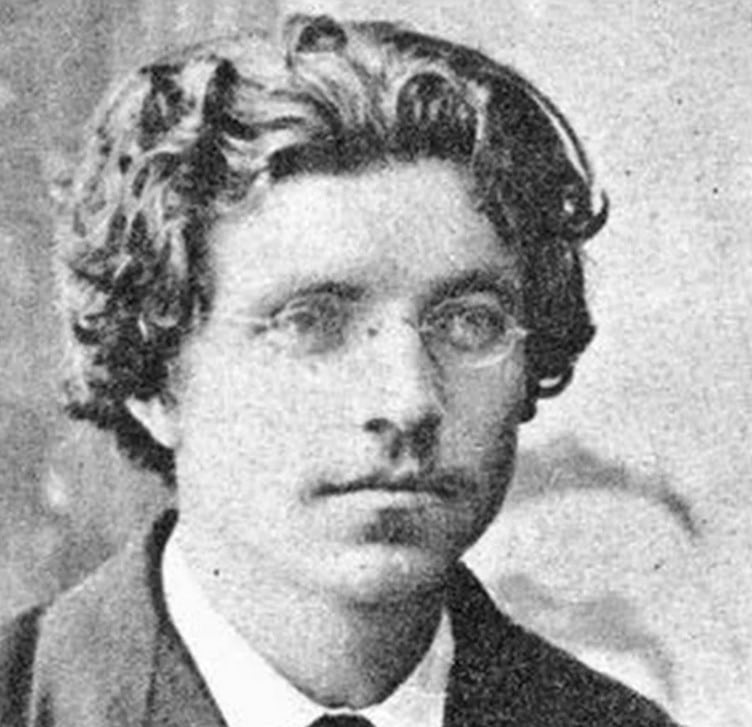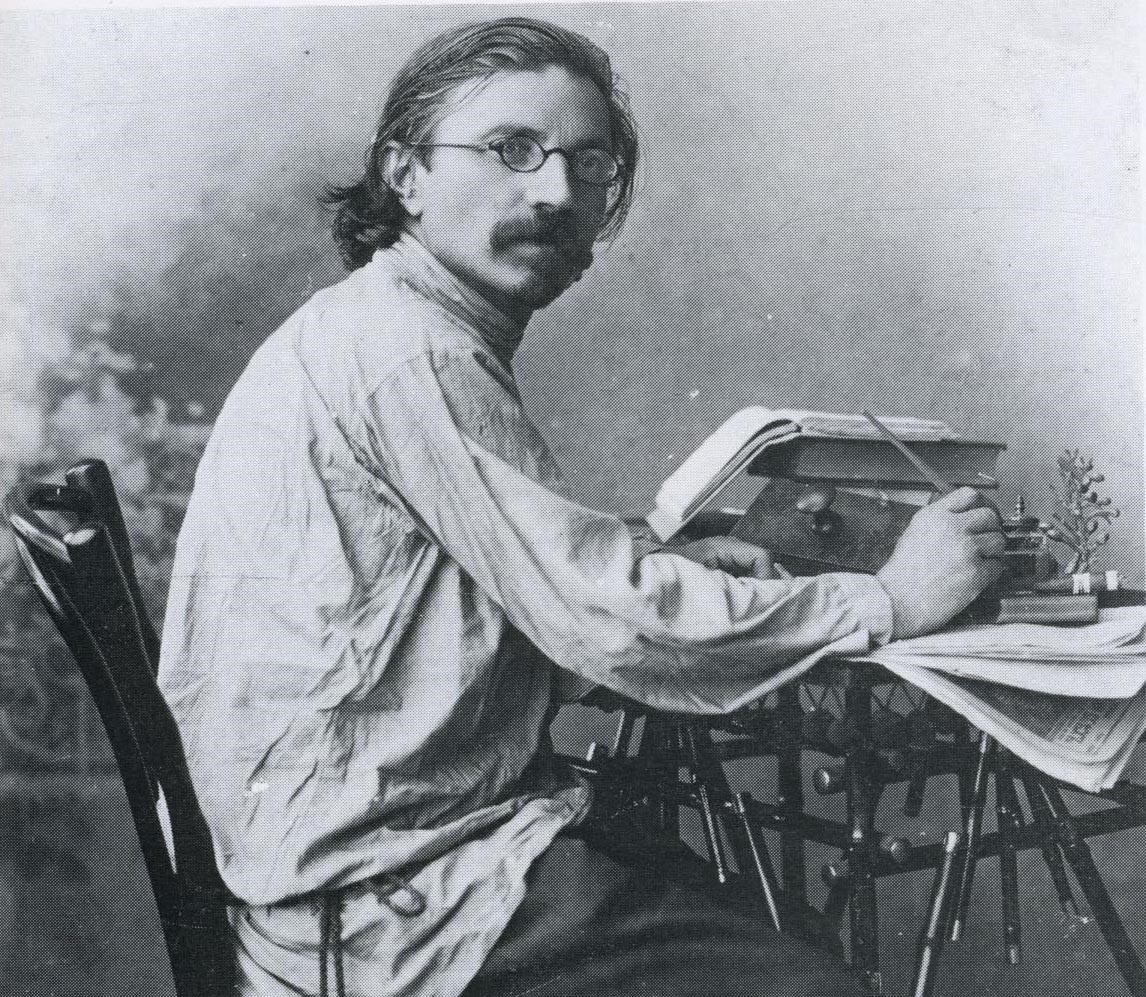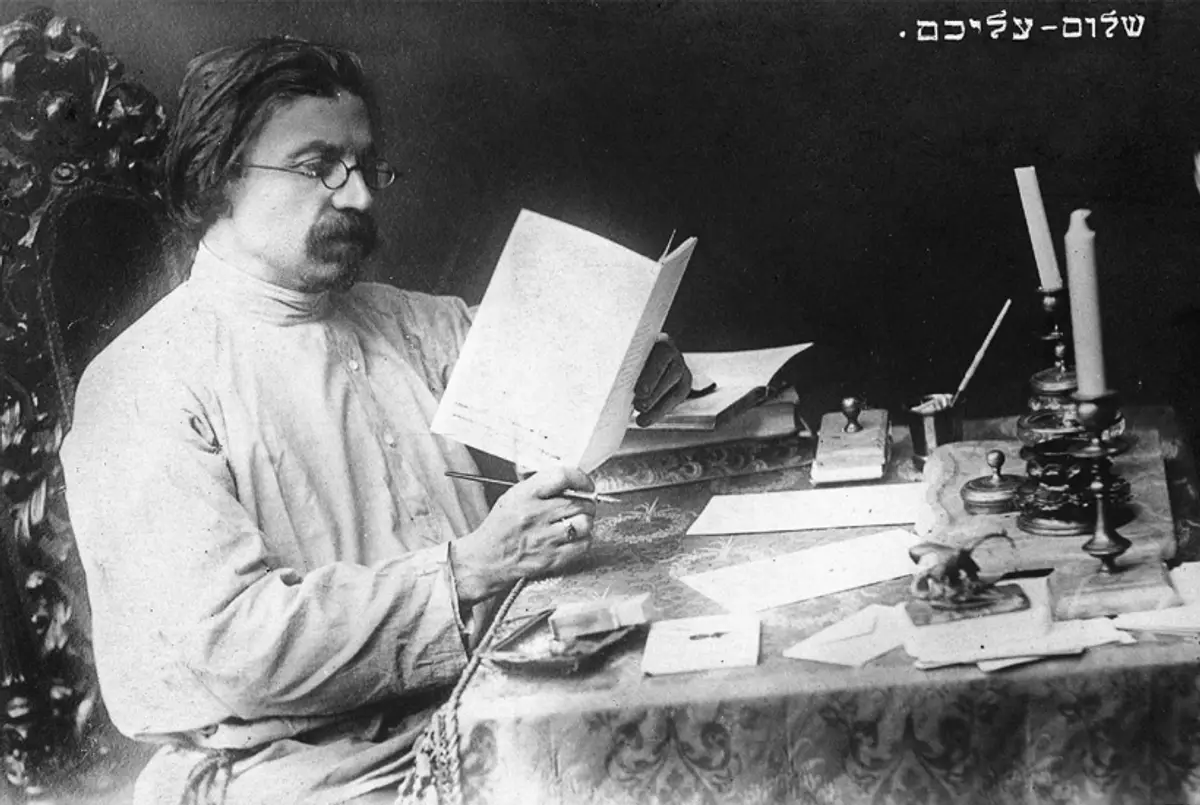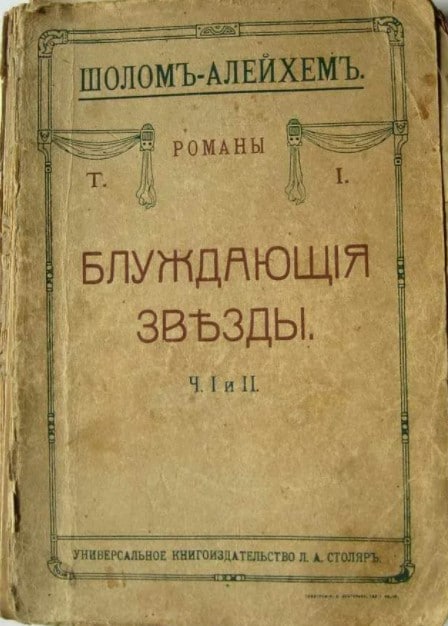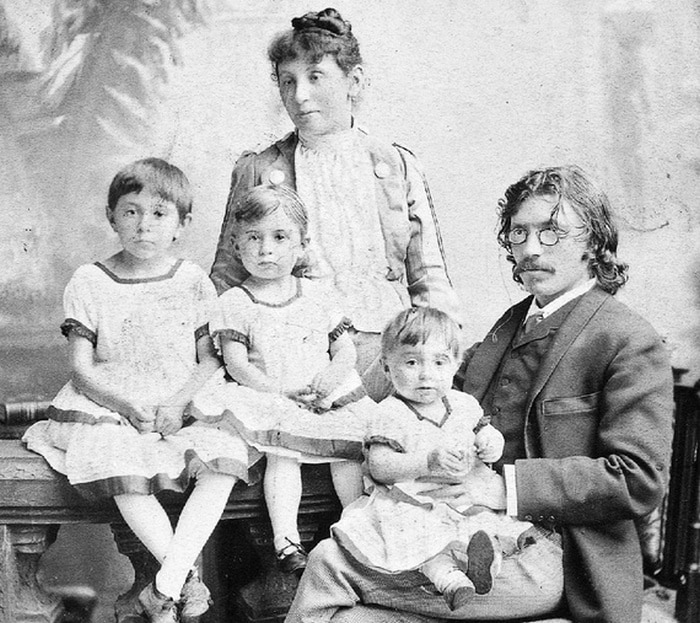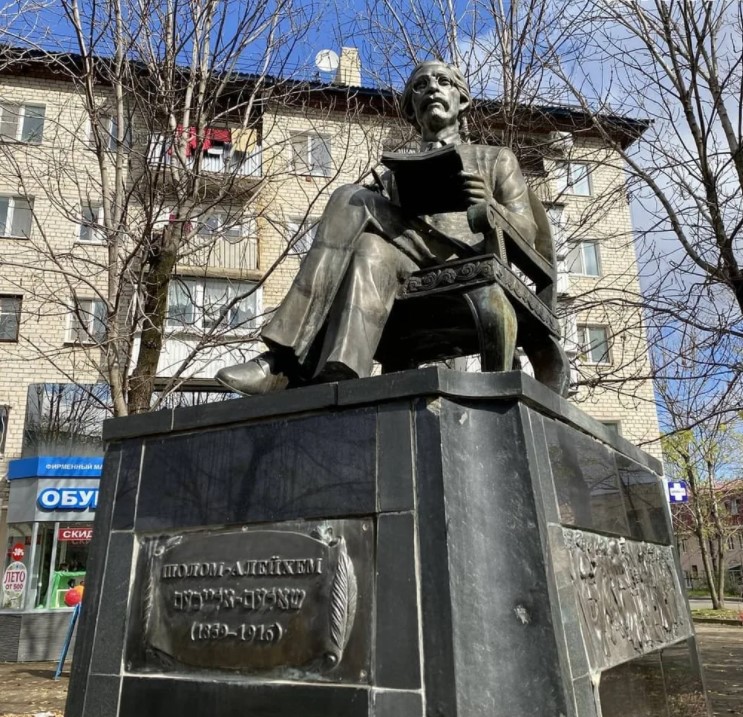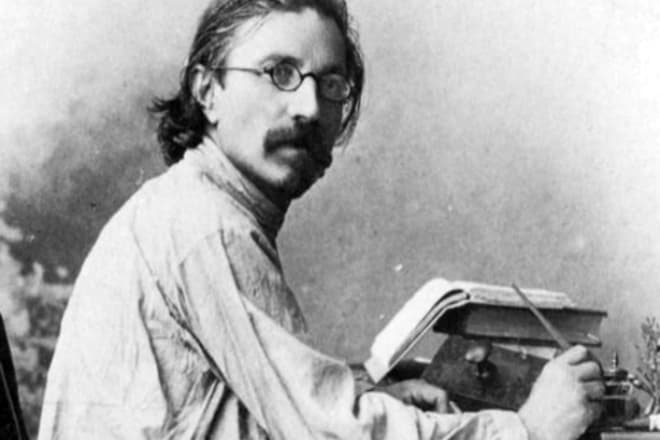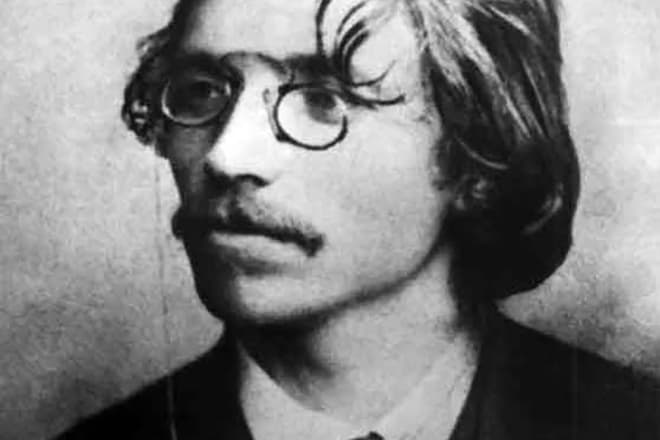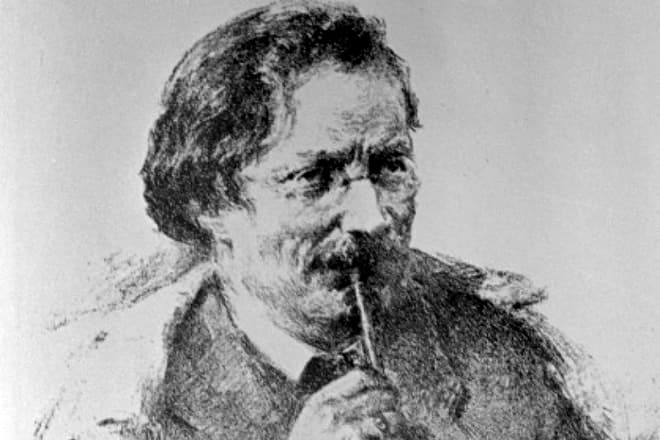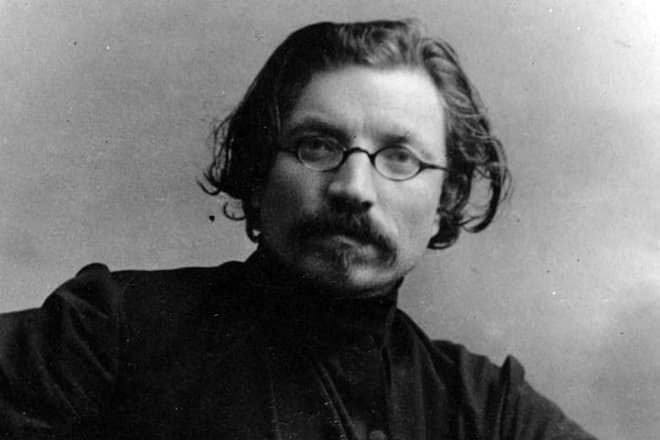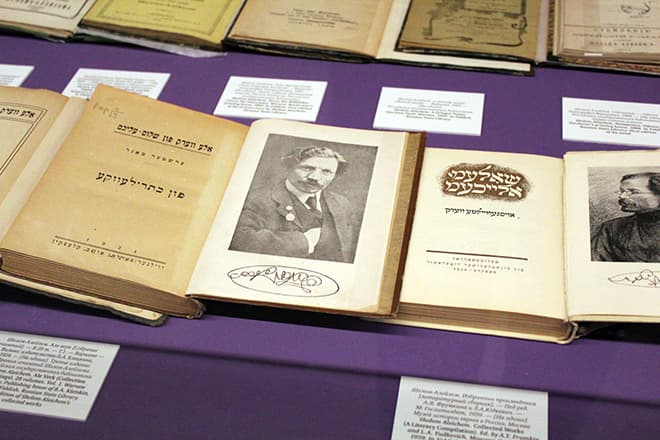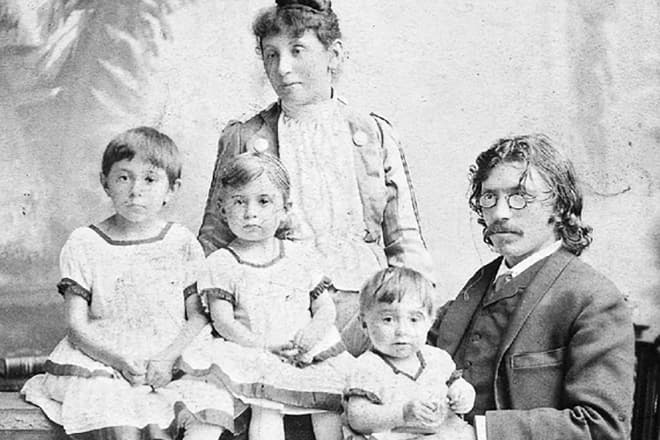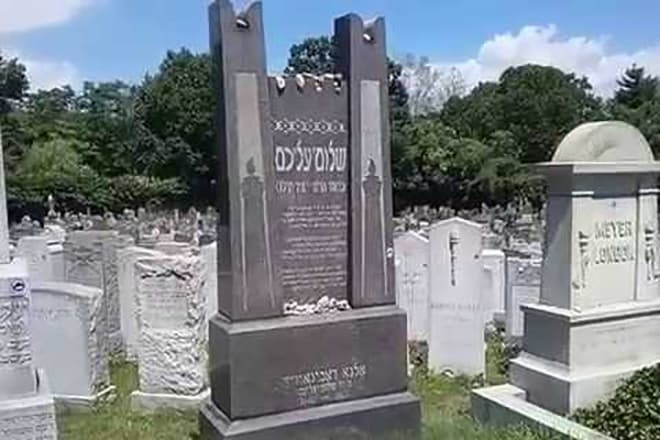Шолом-Алейхем — биография
Шолом-Алейхем – еврейский литератор конца 19-го – начала 20-го века, автор сатирических повестей, романов и фельетонов. Одним из первых писателей, начавших публиковать произведения исключительно на идише.
Еврейский писатель Шолом-Алейхем является истинной гордостью своего народа. Именно ему принадлежат одни из самых увлекательных описаний жизни и традиций евреев, а также их самобытного юмора. Автор в числе первых начал популяризировать идиш, издав десятки детских и взрослых книг на этом древнем языке.
Детство и юность
Настоящее имя литератора – Соломон Рабинович. Родился он 2 марта 1859 года в украинском городе Переяславль (ныне Переяслав-Хмельницкий). Мать мальчика умерла рано, поэтому ранняя биография будущего писателя прошла в селе Вороньково под Борисполем, где проживали его родственники.
Соломон всегда выделялся среди ровесников склонностью к философствованию. Юноша раньше всех научился читать и писать, и уже к подростковому возрасту он изучил несколько десятков крупных произведений. Любимой книгой будущего писателя стала «Робинзон Крузо» Даниэля Дефо, вдохновившая его на создание собственных шедевров. В пятнадцатилетнем возрасте юный Рабинович начал писать под творческим псевдонимом Шолом-Алейхем, что по-еврейски означает буквально «мир вам».
После школы Соломон устроился на работу репетитором – обучал отпрысков состоятельных родителей базовым школьным предметам. В числе подопечных молодого педагога была девушка по имени Голда Лоева, дочь богатого предпринимателя. Между молодыми людьми возникла взаимная симпатия, однако отец барышни о браке с полунищим учителем и слушать не желал. Рабинович был вынужден уволиться с работы и вернуться в родные края.
Творчество
Несколько лет жизни писателя ушло на поиск собственного, уникального стиля. До начала 1880-х автор неустанно рассылал свои произведения по издательствам, но, как правило, получал отказы. Лишь одно сочинение того периода увидело свет – это был рассказ «Мечтатели», опубликованный петербургским изданием «Еврейское обозрение».
Соломон Наумович любил живые выступления, во время которых он знакомил читателей со своим творчеством. Он с удовольствием зачитывал публике собственные рассказы, повести и сатирические миниатюры. Со временем молодой автор стал узнаваемым в литературных кругах, его творчество обрело массу поклонников, причем не только из числа евреев.
С начала 1880-х идиш стал главным языком для произведений молодого литератора. Шолом-Алейхем старался раскрыть читателю еврейскую культуру с ее уникальными особенностями, которые можно передать исключительно с помощью родного языка.
Писатель продолжал сотрудничать с «Еврейским обозрением», где публиковались практически все его работы. На страницах журнала впервые появился его короткий рассказ «Выборы», а позже повесть «Два камня».
Основной темой сочинений автора стала повседневная жизнь обитателей еврейских кварталов, наполненная неповторимым национальным колоритом. За свойственной Рабиновичу манерой иронично описывать образы соотечественников, легко заметить его безмерную любовь к родному народу. В творчестве Шолом-Алейхема много произведений, посвященных классовому неравенству, разделению людей на бедных и богатых. Рассказы и повести – это всего лишь часть библиографии автора. За годы писательской карьеры он выпустил ряд поэтических сборников, романов и сатирических фельетонов.
К «бульварной» литературе Соломон Наумович относился скептически. Он считал, что надуманные, незамысловатые сюжеты для читателя не только бесполезны, но и вредны. Творчество должно приносить людям познания, приучать к гуманизму и стремлению сохранять культурное наследие для будущих поколений.
В 1894-м Шолом-Алейхем опубликовал сатирическое произведение «Якнехоз, или Большая биржевая игра», расширившее круг почитателей его таланта. Роман взяли на вооружение театральные драматурги, и несколько лет зрители могли наслаждаться искрометными постановками на злободневные темы. Позже книга попала под цензуру, и любое ее цитирование было запрещено.
У писателя была огромная аудитория в Соединенных Штатах, где и тогда проживала еврейская диаспора. В американской прессе нередко появлялись короткие юмористические публикации автора, которые со временем стали популярными как среди евреев, так и среди представителей других национальностей.
По мнению литературных критиков, самым знаковым произведением в творчестве Рабиновича стал роман «Блуждающие звезды», увидевший свет в начале 20-го века. Книга публиковалась постепенно, по мере завершения очередных глав. Окончательный вариант в двух томах был издан в 1910 году: первая часть получила название «Актеры», а вторая – «Скитальцы».
С годами «Блуждающие звезды» превратились в настоящий бестселлер: их перевели на несколько языков, а в начале 1990-х российские кинематографисты представили одноименную экранизацию этого замечательного романа. В фильме режиссера Всеволода Шиловского были задействованы такие прославленные артисты, как Софико Чиаурели, Лариса Удовиченко, Стас Садальский, Ольга Кабо и Олег Школьник.
В 1912 году Шолом-Алейхем закончил работу над романом «Кровавая шутка», вызвавшим среди читателей и критиков противоречивые эмоции. Это история двух студентов христианской и еврейской конфессии, которые на спор поменялись документами, что привело как к веселым, так и к печальным последствиям для обоих шутников. К сожалению, автор так и не дожил до публикации своего детища, попавшего под запрет цензуры.
Не менее популярным произведением писателя стала повесть «Мальчик Мотл», изданная в нескольких частях. Ее героями стали евреи-эмигранты, оказавшиеся в Соединенных Штатах Америки. Еще одно сочинение – «С ярмарки» — Рабинович называл своеобразным «духовным завещанием» и признавался, что оно во многом является автобиографичным.
Могут быть знакомы
Личная жизнь
Несмотря на протест со стороны отца Голды, молодые люди в итоге поженились, и их личная жизнь сложилась весьма благополучно. У счастливых родителей родилось шестеро наследников.
После смерти тестя Шолом-Алейхем получил доступ к его довольно богатому наследству. Свалившиеся на голову денежные средства писатель потратил на поддержку молодых еврейских литераторов и некоторые рискованные мероприятия, обещавшие принести прибыль. Вложение средств оказалось неоправданным и Рабинович вскоре прогорел.
Смерть
По примеру тысяч соотечественников Шолом-Алейхем эмигрировал в Америку. В последние годы у писателя обострился туберкулез, который ему диагностировали довольно давно.
13 мая 1916 года Соломон Наумович скончался, на тот момент ему было всего 57 лет. Знаменитого еврейского автора похоронили на одном из нью-йоркских кладбищ.
Произведения
- Тайбеле
- Детская игра
- Иоселе-Соловей
- Сендер Бланк и его семейка
- В бурю
- Стемпеню
- Блуждающие звёзды
- Кровавая шутка
- С ярмарки
- Два камня
- Менахем-Мендл
- Тевье-молочник
- Мошкеле-вор
- Домой на Пасху
- Аман и его дочери
- Мальчик Мотл
- Песнь песней
- Летние романы
- Рассказы для еврейских детей
- Неунывающие
- Касриловка
- Монологи
- Железнодорожные рассказы
Ссылки
- Страница в Википедии
Для нас важна актуальность и достоверность информации. Если вы обнаружили ошибку или неточность, пожалуйста, сообщите нам. Выделите ошибку и нажмите сочетание клавиш Ctrl+Enter.
Биография
Шолом-Алейхем — писатель, которого нередко называют светочем еврейской литературы. Именно ему удалось описать жизнь и традиции евреев, подчеркнув мудрость и чувство юмора этого народа. Шолом-Алейхем одним из первых решился писать на идише, пополнив культурную копилку этого языка детскими и взрослыми книгами, которые до сих пор любимы читателями любых наций и возрастов.
Детство и юность
Соломон Наумович Рабинович — таково настоящее имя писателя — родился 2 марта 1859 года в городе Переяславле (старое название города Переяслава-Хмельницкого). Детство будущего писателя прошло в селе Воронькове (ныне это Киевская область, Бориспольский район). Соломон рано потерял мать — мальчику едва исполнилось 13, когда она умерла.
С раннего возраста Соломон Рабинович отличался от сверстников вдумчивостью и любовью к размышлениям. Писать Соломон тоже начал довольно рано, а уже в 15 лет, вдохновленный произведением Даниэля Дефо «Робинзон Крузо», юноша задумал стать настоящим писателем. Тогда же появился и псевдоним Шолом-Алейхем, что в переводе означает «мир вам» — именно так звучит традиционное приветствие евреев.
Окончив школу, Соломон Рабинович сразу начал работать. Юноша занимался репетиторством, обучая детей обеспеченных родителей школьным дисциплинам. Одной из учениц Соломона оказалась Голдэ Лоева (в некоторых источниках девушку называют Ольгой).
Между наставником и ученицей возникло нежное романтическое чувство, однако отец девушки, предприниматель Лоев, выступил категорически против брака любимой дочери с нищим учителем. Так Шолом-Алейхем лишился этой работы и вынужденно возвратился в родной Переяславль.
Литература
До 1880 года Шолом-Алейхем оттачивал собственный стиль и постоянно рассылал статьи и рассказы в разные журналы в надежде на публикацию. Однако столь же постоянно получал отказы — только одно произведение Шолом-Алейхема было опубликовано в этот период (речь идет о рассказе под названием «Мечтатели», напечатанном в петербургском «Еврейском обозрении»).
Параллельно с писательством Шолом-Алейхем осваивал и публичную деятельность: Соломону Рабиновичу нравилось выступать на публике, зачитывая миниатюры и рассказы собственного сочинения. Постепенно имя Шолом-Алейхема стало узнаваемым, у писателя появились первые поклонники.
В начале 1880 годов в литературной биографии Шолом-Алейхема открылась новая страница: писатель начал писать исключительно на идише. Шолом-Алейхему хотелось сохранить и раскрыть богатую еврейскую культуру, и использование исконного языка казалось ему важным.
Первые серьезные произведения — повесть «Два камня» и короткий рассказ под названием «Выборы» в том же самом «Еврейском обозрении». Этот еженедельник стал для писателя родным: практически все труды Шолом-Алейхема впервые появлялись на его страницах.
Писателю удалось ярко и образно описать нравы и внутреннюю атмосферу колоритных еврейских кварталов. Однако за самоиронией и самокритичностью легко угадывается любовь Солом-Алейхема к своему народу. Есть в творчестве литератора и рассказы, посвященные неравенству в обществе, проблемам, которые рождаются там, где бытует четкое разделение на богатых и бедных. Писатель не ограничивал себя четкими рамками рассказов или повестей. Среди произведений Шолом-Алейхема есть и юмористические фельетоны, и романы в письмах, и поэзия.
Также писателя волновала «бульварная» литература. Шолом-Алейхем, не жалея сил, высмеивал простоватые надуманные сюжеты подобных романов, полагая, что литература должна быть более серьезной и даже поучительной. А основная задача письменного слова, как подчеркивал писатель, прививать людям гуманизм и сохранять народную культуру для потомков.
Успех у читателей имел сатирический роман «Якнехоз, или Большая биржевая игра», напечатанный в 1894 году. Это произведение даже попало в репертуары театров и с аншлагом ставилось на сцене, однако позднее роман запретили цензурой. Параллельно с собственными изданиями Шалом-Алейхем работал над короткими публикациями для американских журналов. Сатирические очерки писателя пользовались успехом у евреев, живших в Соединенных Штатах.
Одним из ключевых произведений писателя критики называют роман под названием «Блуждающие звезды», завершенный в 1910 году. По мере написания главы произведения публиковались в журналах и газетах, а затем вышли отдельным двухтомником (первая часть книги получила название «Актеры», вторая вышла как «Скитальцы»).
«Блуждающие звезды» до сих пор переиздаются на разных языках, кроме того, этот роман экранизирован режиссером Всеволодом Шиловским в 1991 году. В картине снялись актеры Софико Чиаурели, Ольга Кабо, Станислав Садальский, Олег Школьник, Лариса Удовиченко.
Роман «Кровавая шутка», законченный Шолом-Алейхемом в 1912-м, также вызвал обсуждения и противоречивую критику. В центре сюжета — два студента, христианин и еврей. Друзья, поспорив, в шутку обменялись паспортами, что становится началом приключений для одного и суровых испытаний для второго шутника. При жизни писателя это произведение так и не было опубликовано из-за цензуры.
Еще одно заметное произведение Шолом-Алейхема — повесть «Мальчик Мотл», состоящая из нескольких частей. Здесь писатель описывает жизнь евреев в американской эмиграции устами маленького мальчика-сироты, который только начинает узнавать этот мир. Другую работу — «С ярмарки» — Шолом-Алейхем называл «духовным завещинием». Писатель подчеркивал, что в это отчасти автобиографическое произведение он вложил свое сердце.
Личная жизнь
Личная жизнь писателя сложилась счастливо: Голдэ Лоева, в которую Шолом-Алейхем влюбился в ранней юности, вышла за него замуж даже вопреки желанию отца. В этом браке родились шестеро детей.
Отец Голдэ оставил дочери серьезное наследство, которое Шолом-Алейхем быстро потратил на публикации молодых еврейских авторов, которым тогда помогал, а также на рискованные и сомнительные авантюры, которые должны были принести прибыль, но не принесли.
Смерть
Последние годы жизни писатель провел в Нью-Йорке. 13 мая 1916 года Шолом-Алейхема не стало. Литератора сгубил туберкулез, который много лет подтачивал его здоровье. Писателю было 57 лет. После смерти Шолом-Алейхем похоронен в Куинсе (Нью-Йорк).
На надгробии писателя вместо фото начертана эпитафия, которую Шолом-Алейхем написал сам. Она начинается словами:
Здесь погребен простой еврей.
Он был писатель из народа,
Всю жизнь писал он для людей
Простого звания и рода.
Библиография
- 1883 — «Два камня»
- 1884 — «Тайбеле»
- 1886 — «Детская игра»
- 1886 — «Иоселе-Соловей»
- 1888 — «Стемпеню»
- 1903 — «Мошкеле-вор»
- 1903 — «Домой на Пасху»
- 1903 — «Аман и его дочери»
- 1907 — «В бурю»
- 1907-1916 — «Мальчик Мотл»
- 1916 — «С ярмарки»
|
Sholem Aleichem |
|
|---|---|

Sholem Aleichem, 1907 |
|
| Born | Shulim Nukhimovich Rabinovich March 2 [O.S. February 18] 1859 Pereiaslav, Ukraine |
| Died | May 13, 1916 (aged 57) New York City, U.S. |
| Pen name | Sholem Aleichem (Yiddish: שלום עליכם) |
| Occupation | Writer |
| Language | Yiddish |
| Genre | Novels, short stories, plays |
| Literary movement | Yiddish revival |
| Signature | |
 |
Sholem Aleichem statue in Netanya, Israel
Solomon Naumovich Rabinovich (Соломон Наумович Рабинович), better known under his pen name Sholem Aleichem (Yiddish and Hebrew: שלום עליכם, also spelled שאָלעם־אלייכעם in Soviet Yiddish, [ˈʃɔləm aˈlɛjxəm]; Russian and Ukrainian: Шо́лом-Але́йхем) (March 2 [O.S. February 18] 1859 – May 13, 1916), was a Yiddish author and playwright who lived in the Russian Empire and in the United States.[1] The 1964 musical Fiddler on the Roof, based on Aleichem’s stories about Tevye the Dairyman, was the first commercially successful English-language stage production about Jewish life in Eastern Europe.
The Hebrew phrase שלום עליכם (shalom aleichem) literally means «[May] peace [be] upon you!», and is a greeting in traditional Hebrew and Yiddish.[2]
Biography[edit]
Solomon Naumovich (Shulim Nukhimovich) Rabinovich (Russian: Соломо́н Нау́мович (Шулим Нухимович) Рабино́вич) was born in 1859 in Pereiaslav and grew up in the nearby shtetl of Voronkiv [uk], in the Poltava Governorate of the Russian Empire (now in the Kiev Oblast of central Ukraine).[3] (Voronkiv has become the prototype of Aleichem’s Kasrilevka.[4]) His father, Menachem-Nukhem Rabinovich, was a rich merchant at that time.[5] However, a failed business affair plunged the family into poverty and Solomon Rabinovich grew up in reduced circumstances.[5] When he was 13 years old, the family moved back to Pereiaslav, where his mother, Chaye-Esther, died in a cholera epidemic.[6]
Sholem Aleichem’s first venture into writing was an alphabetic glossary of the epithets used by his stepmother. At the age of fifteen, he composed a Jewish version of the novel Robinson Crusoe. He adopted the pseudonym Sholem Aleichem, a Yiddish variant of the Hebrew expression shalom aleichem, meaning «peace be with you» and typically used as a greeting.
In 1876, after graduating from school in Pereiaslav, he began to work as a teacher. During 1877-1880 in Sofijka village, Bohuslav region, he spent three years tutoring a wealthy landowner’s daughter,[7] Olga (Hodel) Loev (1865–1942).[8] From 1880 to 1883 he served as crown rabbi in Lubny.[9]
On May 12, 1883, he and Olga married, against the wishes of her father, whose estate they inherited a few years later. Their first child, a daughter named Ernestina (Tissa), was born in 1884. In 1890, Sholem Aleichem lost their entire fortune in stock speculation and fled from his creditors.[10] Daughter Lyalya (Lili) was born in 1887. As Lyalya Kaufman, she became a Hebrew writer. (Lyalya’s daughter Bel Kaufman, also a writer, was the author of Up the Down Staircase, which was also made into a successful film.) A third daughter, Emma, was born in 1888. In 1889, Olga gave birth to a son. They named him Elimelech, after Olga’s father, but at home they called him Misha. Daughter Marusi (who would one day publish «My Father, Sholom Aleichem» under her married name Marie Waife-Goldberg) was born in 1892. A final child, a son named Nochum (Numa) after Solomon’s father was born in 1901 (under the name Norman Raeben he became a painter and an influential art teacher).
After witnessing the pogroms that swept through southern Russia in 1905, including Kyiv, Sholem Aleichem left Kyiv (which was fictionalized as Yehupetz) and immigrated to New York City, where he arrived in 1906. His family[clarification needed] set up house in Geneva, Switzerland, but when he saw he could not afford to maintain two households, he joined them in Geneva in 1908. Despite his great popularity, he was forced to take up an exhausting schedule of lecturing to make ends meet. In July 1908, during a reading tour in Russia, Sholem Aleichem collapsed on a train going through Baranowicze. He was diagnosed with a relapse of acute hemorrhagic tuberculosis and spent two months convalescing in the town’s hospital. He later described the incident as «meeting his majesty, the Angel of Death, face to face», and claimed it as the catalyst for writing his autobiography, Funem yarid [From the Fair].[3] He thus missed the first Conference for the Yiddish Language, held in 1908 in Czernovitz; his colleague and fellow Yiddish activist Nathan Birnbaum went in his place.[11]
Sholem Aleichem spent the next four years living as a semi-invalid. During this period the family was largely supported by donations from friends and admirers (among his friends and acquaintances were fellow Yiddish authors I. L. Peretz, Jacob Dinezon, Mordecai Spector, and Noach Pryłucki). In 1909, in celebration of his 25th Jubilee as a writer, his friend and colleague Jacob Dinezon spearheaded a committee with Dr. Gershon Levine, Abraham Podlishevsky, and Noach Pryłucki to buy back the publishing rights to Sholem Aleichem’s works from various publishers for his sole use in order to provide him with a steady income.[12] At a time when Sholem Aleichem was ill and struggling financially, this proved to be an invaluable gift, and Sholem Aleichem expressed his gratitude in a thank you letter in which he wrote,
“If I tried to tell you a hundredth part of the way I feel about you, I know that that would be sheer profanation. If I am fated to live a few years longer than I have been expecting, I shall doubtless be able to say that it’s your fault, yours and that of all the other friends who have done so much to carry out your idea of ‘the redemption of the imprisoned.’”[13]
— Sholem Aleichem
Sholem Aleichem moved to New York City again with his family in 1914. The family lived at first in Harlem at 110 Lenox Avenue (at 116th Street) and later moved to 968 Kelly Street in the Bronx. His son, Misha, ill with tuberculosis, was not permitted entry under United States immigration laws and remained in Switzerland with his sister Emma.
Sholem Aleichem died at his Bronx apartment in 1916. He is buried in the main (old) section of Mount Carmel Cemetery in Queens, New York City.[14]
Literary career[edit]
A volume of Sholem Aleichem stories in Yiddish, with the author’s portrait and signature
Like his contemporaries Mendele Mocher Sforim, I.L. Peretz, and Jacob Dinezon, Sholem Rabinovitch started writing in Hebrew, as well as in Russian. In 1883, when he was 24 years old, he published his first Yiddish story, צוויי שטיינער Tsvey Shteyner («Two Stones»), using for the first time the pseudonym Sholem Aleichem.
By 1890 he was a central figure in Yiddish literature, the vernacular language of nearly all East European Jews, and produced over forty volumes in Yiddish. It was often derogatorily called «jargon», but Sholem Aleichem used this term in an entirely non-pejorative sense.
Apart from his own literary output, Sholem Aleichem used his personal fortune to encourage other Yiddish writers. In 1888–89, he put out two issues of an almanac, די ייִדישע פאָלקסביבליאָטעק Di Yidishe Folksbibliotek («The Yiddish Public Library») which gave important exposure to young Yiddish writers.
In 1890, after he lost his entire fortune, he could not afford to print the almanac’s third issue, which had been edited but was subsequently never printed.
Tevye the Dairyman, in Yiddish טבֿיה דער מילכיקער Tevye der Milchiker, was first published in 1894.
Over the next few years, while continuing to write in Yiddish, he also wrote in Russian for an Odessa newspaper and for Voskhod, the leading Russian Jewish publication of the time, as well as in Hebrew for Ha-melitz, and for an anthology edited by YH Ravnitzky. It was during this period that Sholem Aleichem contracted tuberculosis.
In August 1904, Sholem Aleichem edited הילף : א זאַמלבוך פיר ליטעראטור אונ קונסט Hilf: a Zaml-Bukh fir Literatur un Kunst («Help: An Anthology for Literature and Art»; Warsaw, 1904) and himself translated three stories submitted by Tolstoy (Esarhaddon, King of Assyria; Work, Death and Sickness; The Three Questions) as well as contributions by other prominent Russian writers, including Chekhov, in aid of the victims of the Kishinev pogrom.
Critical reception[edit]
Sholem Aleichem’s narratives were notable for the naturalness of his characters’ speech and the accuracy of his descriptions of shtetl life. Early critics focused on the cheerfulness of the characters, interpreted as a way of coping with adversity. Later critics saw a tragic side in his writing.[15] He was often referred to as the «Jewish Mark Twain» because of the two authors’ similar writing styles and use of pen names. Both authors wrote for adults and children and lectured extensively in Europe and the United States. When Twain heard of the writer called «the Jewish Mark Twain,» he replied «please tell him that I am the American Sholem Aleichem.»[16]
Beliefs and activism[edit]
Sholem Aleichem was an impassioned advocate of Yiddish as a national Jewish language, which he felt should be accorded the same status and respect as other modern European languages. He did not stop with what came to be called «Yiddishism», but devoted himself to the cause of Zionism as well. Many of his writings[17] present the Zionist case. In 1888, he became a member of Hovevei Zion. In 1907, he served as an American delegate to the Eighth Zionist Congress held in The Hague.
Sholem Aleichem had a fear of the number 13. His manuscripts never had a page 13; he numbered the thirteenth pages of his manuscripts as 12a.[18] Though it has been written that even his headstone carries the date of his death as «May 12a, 1916»,[19] his headstone reads the dates of his birth and death in Hebrew, the 26th of Adar and the 10th of Iyar, respectively.
Death[edit]
Sholem Aleichem’s funeral on May 15, 1916
Sholem Aleichem died in New York on May 13, 1916 from tuberculosis and diabetes,[20] aged 57, while working on his last novel, Motl, Peysi the Cantor’s Son, and was buried at Old Mount Carmel cemetery in Queens.[21] At the time, his funeral was one of the largest in New York City history, with an estimated 100,000 mourners.[22][23] The next day, his will was printed in the New York Times and was read into the Congressional Record of the United States.
Commemoration and legacy[edit]
Israeli postal stamp, 1959
Sholem Aleichem’s will contained detailed instructions to family and friends with regard to burial arrangements and marking his yahrtzeit.
He told his friends and family to gather, «read my will, and also select one of my stories, one of the very merry ones, and recite it in whatever language is most intelligible to you.» «Let my name be recalled with laughter,» he added, «or not at all.» The celebrations continue to the present day, and, in recent years, have been held at the Brotherhood Synagogue on Gramercy Park South in New York City, where they are open to the public.[24]
He composed the text to be engraved on his tombstone in Yiddish, given here in transliteration:
|
Do ligt a yid a posheter Di gantse lebn umgelozt geshlogen mit der welt kapores Un dafka demolt geven der oylem hot gelacht |
Here lies a Jew a simple one, He circled the world like Kapparot But when the world is laughing |
| —[whose translation?] |
In 1997, a monument dedicated to Sholem Aleichem was erected in Kiev; another was erected in 2001 in Moscow.
The main street of Birobidzhan is named after Sholem Aleichem;[25] streets were named after him also in other cities in the Soviet Union, including Kiev, Odessa, Vinnytsia, Lviv, and Zhytomyr. In New York City in 1996, East 33rd Street between Park and Madison Avenue is additionally named «Sholem Aleichem Place». Many streets in Israel are named after him.
Postage stamps of Sholem Aleichem were issued by Israel (Scott #154, 1959); the Soviet Union (Scott #2164, 1959); Romania (Scott #1268, 1959); and Ukraine (Scott #758, 2009).
An impact crater on the planet Mercury also bears his name.[26]
On March 2, 2009, 150 years after his birth, the National Bank of Ukraine issued an anniversary coin depicting and celebrating Aleichem.[27]
Vilnius, Lithuania has a Jewish school named after him and in Melbourne, Australia a Yiddish school, Sholem Aleichem College is named after him.[28] Several Jewish schools in Argentina were also named after him.[citation needed]
In Rio de Janeiro, Brazil a library named BIBSA – Biblioteca Sholem Aleichem was founded in 1915 as a Zionist institution by a local Jewish group. Next year, in 1916 same group that created BIBSA, founded a Jewish school named Escola Sholem Aleichem that was closed in 1997. BIBSA had a very active theatrical program in Yiddish for more than 50 years since its foundation and consistently performed Sholem Aleichem plays. In 1947 BIBSA became Associação Sholem Aleichem, under which name it continues to exist. Both the library and club became communist institutions due to a normal transition of power in the founding group, although non-communist members left to found their own school, Colégio Eliezer Steinbarg, in 1956. It is named after the first director of Escola Sholem Aleichem, a Jewish writer born in Romania who immigrated to Brazil.[29][30]
In the Bronx, New York, a housing complex called The Shalom Aleichem Houses[31] was built by Yiddish speaking immigrants in the 1920s, and was recently restored by new owners to its original grandeur. The Shalom Alecheim Houses are part of a proposed historic district in the area.
On May 13, 2016 a Sholem Aleichem website was launched to mark the 100th anniversary of Sholem Aleichem’s death.[32] The website is a partnership between Sholem Aleichem’s family,[33] his biographer Professor Jeremy Dauber,[34] Citizen Film, Columbia University’s Center for Israel and Jewish Studies,[35] The Covenant Foundation, and The Yiddish Book Center.[36] The website features interactive maps and timelines,[37] recommended readings,[38] as well as a list of centennial celebration events taking place worldwide.[39] The website also features resources for educators.[40][41][42]
Hertz Grosbard recited many of his works in so called «word concerts». A reading in Yiddish of his monologue If I Were a Rothschild and several others can be found on the Grosbard Project.
Writer’s brother Wolf Rabinovich published the memoir «My Brother Sholom Aleichem» in Kiev, Soviet Union, in 1939.[43]
Sholem Aleichem’s granddaughter, Bel Kaufman, by his daughter Lala (Lyalya), was an American author, most widely known for her novel, Up the Down Staircase, published in 1964, which was adapted to the stage and also made into a motion picture in 1967, starring Sandy Dennis.
Published works[edit]
English-language collections[edit]
- Tevye’s Daughters: Collected Stories of Sholom Aleichem by Sholem Aleichem, transl Frances Butwin, illus Ben Shahn, NY: Crown, 1949. The stories which form the basis for Fiddler on the Roof.
- The Best of Sholom Aleichem, edited by R. Wisse, I. Howe (originally published 1979), Walker and Co., 1991, ISBN 0-8027-2645-3.
- Tevye the Dairyman and the Railroad Stories, translated by H. Halkin (originally published 1987), Schocken Books, 1996, ISBN 0-8052-1069-5.
- Nineteen to the Dozen: Monologues and Bits and Bobs of Other Things, translated by Ted Gorelick, Syracuse Univ Press, 1998, ISBN 0-8156-0477-7.
- A Treasury of Sholom Aleichem Children’s Stories, translated by Aliza Shevrin, Jason Aronson, 1996, ISBN 1-56821-926-1.
- Inside Kasrilovka, Three Stories, translated by I. Goldstick, Schocken Books, 1948 (variously reprinted)
- The Old Country, translated by Julius & Frances Butwin, J B H of Peconic, 1999, ISBN 1-929068-21-2.
- Stories and Satires, translated by Curt Leviant, Sholom Aleichem Family Publications, 1999, ISBN 1-929068-20-4.
- Selected Works of Sholem-Aleykhem, edited by Marvin Zuckerman & Marion Herbst (Volume II of «The Three Great Classic Writers of Modern Yiddish Literature»), Joseph Simon Pangloss Press, 1994, ISBN 0-934710-24-4.
- Some Laughter, Some Tears, translated by Curt Leviant, Paperback Library, 1969, Library of Congress Catalog Card Number 68–25445.
Autobiography[edit]
- פונעם יאריד Funem yarid, written 1914–1916, translated as The Great Fair by Tamara Kahana, Noonday Press, 1955; translated by Curt Leviant as From the Fair, Viking, 1986, ISBN 0-14-008830-X.
Novels[edit]
- Stempenyu: A Jewish Novel, originally published in his Folksbibliotek, adapted 1905 for the play Jewish Daughters.
- Yossele Solovey (1889, published in his Folksbibliotek)
- Tevye’s Daughters, translated by F. Butwin (originally published 1949), Crown, 1959, ISBN 0-517-50710-2.
- Mottel the Cantor’s son. Originally written in Yiddish. English version: Henry Schuman, Inc. New York 1953, Translated by Tamara Kahana (6a), the author’s grand daughter.
- In The Storm
- Wandering Stars
- Marienbad, translated by Aliza Shevrin (1982, G.P. Putnam Sons, New York) from original Yiddish manuscript copyrighted by Olga Rabinowitz in 1917
- The Bloody Hoax
- Menahem-Mendl, translated as The Adventures of Menahem-Mendl, translated by Tamara Kahana, Sholom Aleichem Family Publications, 1969, ISBN 1-929068-02-6.
Young adult literature[edit]
- The Bewitched Tailor, Sholom Aleichem Family Publications, 1999, ISBN 1-929068-19-0.
Plays[edit]
- The Doctor (1887), one-act comedy
- Der get (The Divorce, 1888), one-act comedy
- Di asife (The Assembly, 1889), one-act comedy
- Mazel Tov (1889), one-act play
- Yaknez (1894), a satire on brokers and speculators
- Tsezeyt un tseshpreyt (Scattered Far and Wide, 1903), comedy
- Agentn (Agents, 1908), one-act comedy
- Yidishe tekhter (Jewish Daughters, 1905) drama, adaptation of his early novel Stempenyu
- Di goldgreber (The Golddiggers, 1907), comedy
- Shver tsu zayn a yid (Hard to Be a Jew / If I Were You, 1914)
- Dos groyse gevins (The Big Lottery / The Jackpot, 1916)
- Tevye der milkhiker, (Tevye the Milkman, 1917, performed posthumously)
Stage[edit]
- «The World of Sholom Aleichem
Television[edit]
«The World of Sholom Aleichem»
Airdate: December 14, 1959[2]
Channel: WNTA-TV Channel 13, New York City
- Written by Arnold Perl
- Directed by Don Richardson
- Produced by David Suskind & Henry T. Weinstein
Included 3 short tele-plays:
- «A Tale of Chelm» a folktale (author unknown)
- «Bontche Schweig» by I.L. Peretz
- «The High School» (aka «Gymnasium») by Sholem Aleichem.
Starring:
- Gertrude Berg as Hannele (‘The High School’)
- Morris Carnovsky as Rabbi David (‘A Tale of Chelm’); Presiding Angel (‘Bontche Shveig’}; Aaron Katz (‘The High School’)
- Sam Levene as Narrator
- Zero Mostel as the Melamed (‘A Tale of Chelm’)
- Nancy Walker as Rifkele (‘A Tale of Chelm’)
- Charlotte Rae as Angel (‘A Tale of Chelm’)
- Lee Grant as Avenging Angel (‘Bontche Shveig’)
- Jack Gilford as Bontshe Shveig (‘Bontche Shveig’)
- Henry Lascoe as Dodi the Innkeeper (‘A Tale of Chelm’); Principal (‘The High School’)
Miscellany[edit]
- Jewish Children, translated by Hannah Berman, William Morrow & Co, 1987, ISBN 0-688-84120-1.
- numerous stories in Russian, published in Voskhod (1891–1892)
See also[edit]
- 1918 film: «Bloody Joke» (Кровавая шутка), based on the works of Sholem Aleichem, by director and screenwriter Alexander Arkatov
References[edit]
- ^ «Heroes – Trailblazers of the Jewish People». Beit Hatfutsot.
- ^ The parallel greeting in Arabic is السَّلَامُ عَلَيْكُمْ [ʔæs.sæˈlæːmu ʕæˈlæjkʊm] (As-salamu alaykum).
- ^ a b Potok, Chaim (July 14, 1985). «The Human Comedy Of Pereyaslav». New York Times. Retrieved June 16, 2008.
Approaching his 50th birthday, the Yiddish writer Sholom Aleichem (born Sholom Rabinowitz in the Ukraine in 1859) collapsed in Russia while on a reading tour. He was diagnosed as suffering from tuberculosis. As he put it later, ‘I had the privilege of meeting his majesty, the Angel of Death, face to face.’
- ^ Shalom Aleichem (1859 — 1916), Jewish Virtual Library
- ^ a b «Aleichem», Jewish virtual library (biography).
- ^ Aleichem, Sholem (1985), «34. Cholera», From the Fair, Viking Penguin, pp. 100–4.
- ^ Poberezhka-Sofijka villages. 24.04.2016.(in Ukr.)
- ^ Dates on base of Rabinowitz’s gravestone.
- ^ Kaplan Appel, Tamar (August 3, 2010). «Crown Rabbi». The YIVO Encyclopedia of Jews in Eastern Europe. YIVO Encyclopedia of Jews in Eastern Europe. Yale University Press. ISBN 9780300119039. OCLC 170203576. Archived from the original on March 27, 2015. Retrieved May 31, 2015.
- ^ Huttner, Jan Lisa (September 18, 2014). Tevye’s Daughters: No Laughing Matter. New York City, NY: FF2 Media. ASIN B00NQDQCTG. Retrieved October 21, 2014.
- ^ First Yiddish Language Conference. Two roads to Yiddishism (Nathan Birnbaum and Sholem Aleichem) by Louis Fridhandler
- ^ Guide to the Sutzkever Kaczerginski Collection, Part II: Collection of Literary and Historical Manuscripts RG 223.2, YIVO Institute for Jewish Research, [1]
- ^ Sholom Aleichem Panorama, I. D. Berkowitz, translator, M. W. (Melech) Grafstein, editor and publisher, (London, Ontario, Canada: The Jewish Observer, 1948), pp. 343-344
- ^ Wilson, Scott (August 22, 2016). Resting places: the burial sites of more than 14,000 famous persons (Third ed.). Jefferson, North Carolina. p. 14. ISBN 978-0786479924. Retrieved January 22, 2021.
- ^ «Sholom Aleichem Aleichem, Sholom – Essay – eNotes.com». eNotes. Retrieved June 12, 2017.
- ^ Levy, Richard S. Antisemitism: a historical encyclopedia of prejudice and persecution, Volume 2. ABC-CLIO 2005 sv Twain; cites Kahn 1985 p 24
- ^ Oyf vos badarfn Yidn a land, (Why Do the Jews Need a Land of Their Own? Archived March 9, 2006, at the Wayback Machine), translated by Joseph Leftwich and Mordecai S. Chertoff, Cornwall Books, 1984, ISBN 0-8453-4774-8
- ^ «A Reading to Recall the Father of Tevye», Clyde Haberman, New York Times, May 17, 2010
- ^ Hendrickson, Robert (1990). World Literary Anecdotes. New York, New York: Facts on File, Inc. pp. 7. ISBN 0-8160-2248-8.
- ^ Donaldson, Norman and Betty (1980). How Did They Die?. Greenwich House. ISBN 0-517-40302-1.
- ^ Mount Carmel cemetery Archived June 30, 2007, at the Wayback Machine
- ^ «Vast Crowds Honor Sholem Aleichem; Funeral Cortege Of Yiddish Author Greeted By Throngs In Three Boroughs. Many Deliver Eulogies Services At Educational Alliance Include Reading Of Writer’s Will And His Epitaph». New York Times. May 16, 1916. Retrieved April 20, 2008.
A hundred thousand people of the East Side, with sadness in their faces, lined the sidewalks yesterday when the funeral procession of Sholem Aleichem («peace be with you»), the famous Yiddish humorist, whose real name was Solomon Rabinowitz, passed down Second Avenue and through East Houston. Eldridge, and Canal Streets, to the Educational Alliance, where services were held before the body was carried over the Williamsburg Bridge to …
- ^ «2,500 Jews Mourn Sholem Aleichem; «Plain People» Honor Memory Of «Jewish Mark Twain» In Carnegie Hall. Some Of His Stories Read Audience Laughs Through Tears, Just As The Author Had Said He Hoped Friends Would Do». New York Times. May 18, 1916. Retrieved April 20, 2008.
More than 2,500 Jews paid honor to the memory of Sholem Aleichem, the «Mark Twain, who depicted in a style almost epic» the spirit of his race, at a «mourning evening» in Carnegie Hall last night.
- ^ Haberman, Clyde. A Reading to Recall the Father of Tevye. The New York Times. May 17, 2010.
- ^ Raskin, Rebecca. «Back to Birobidjan». Jerusalem Post. Archived from the original on August 13, 2011. Retrieved June 12, 2017.
- ^ MESSENGER: MErcury Surface, Space ENvironment, GEochemistry, and Ranging Archived September 14, 2014, at the Wayback Machine
- ^ Events by themes: To 150th years from the birthday of Sholom-Aleichem NBU issued an anniversary coin, UNIAN photo service (March 2, 2009)
- ^ «Sholem Aleichem College». www.sholem.vic.edu.au. Retrieved June 12, 2017.
- ^ «Eliezer Max». www.eliezermax.com.br. Retrieved June 12, 2017.
- ^ «Colégio Liessin». Colégio Liessin. Retrieved June 12, 2017.
- ^ «SHALOM ALEICHEM HOUSES – Historic Districts Council’s Six to Celebrate». www.6tocelebrate.org. Retrieved June 12, 2017.
- ^ «The Ethical Will». Retrieved June 12, 2017.
- ^ «Sholom Aleichem: The Next Generation». May 16, 2003. Retrieved June 12, 2017.
- ^ Raphael, Frederic (December 20, 2013). «Book Review: ‘The Worlds of Sholem Aleichem’ by Jeremy Dauber». Wall Street Journal. Retrieved June 12, 2017 – via www.wsj.com.
- ^ «The Institute for Israel and Jewish Studies». Archived from the original on January 14, 2016. Retrieved April 8, 2007.
- ^ «About this site» Sholem Aleichem. sholemaleichem.org. Retrieved July 11, 2018.
- ^ «Life & Times – Sholem Aleichem». Retrieved June 12, 2017.
- ^ «Recommended Reading – Sholem Aleichem». Retrieved June 12, 2017.
- ^ «Events – Sholem Aleichem». Retrieved June 12, 2017.
- ^ «Student Activities – Sholem Aleichem». Retrieved June 12, 2017.
- ^ «Syllabi – Sholem Aleichem». Retrieved June 12, 2017.
- ^ «Call to Action – Sholem Aleichem». Retrieved June 12, 2017.
- ^ Wolf Rabinovich, Mayn Bruder Sholem Aleykhem, Kiev, Melukhe-farlag, 1939
Further reading[edit]
- My Father, Sholom Aleichem, by Marie Waife-Goldberg
- Tradition!: The Highly Improbable, Ultimately Triumphant Broadway-to-Hollywood Story of Fiddler on the Roof, the World’s Most Beloved Musical, by Barbara Isenberg, (St. Martin’s Press, 2014.)
- Liptzin, Sol, A History of Yiddish Literature, Jonathan David Publishers, Middle Village, NY, 1972, ISBN 0-8246-0124-6. 66 et. seq.
- A Bridge of Longing, by David G. Roskies
- The World of Sholom Aleichem, by Maurice Samuel
External links[edit]
- The Official Sholem Aleichem Website
- Works by Sholem Aleichem at Project Gutenberg
- Works by or about Sholem Aleichem at Internet Archive
- Works by Sholem Aleichem at LibriVox (public domain audiobooks)
- Haaretz article A stenographer for his people’s soul
- The complete works of Sholem Aleichem (searchable and editable; Yiddish letters only).
|
Sholem Aleichem |
|
|---|---|

Sholem Aleichem, 1907 |
|
| Born | Shulim Nukhimovich Rabinovich March 2 [O.S. February 18] 1859 Pereiaslav, Ukraine |
| Died | May 13, 1916 (aged 57) New York City, U.S. |
| Pen name | Sholem Aleichem (Yiddish: שלום עליכם) |
| Occupation | Writer |
| Language | Yiddish |
| Genre | Novels, short stories, plays |
| Literary movement | Yiddish revival |
| Signature | |
 |
Sholem Aleichem statue in Netanya, Israel
Solomon Naumovich Rabinovich (Соломон Наумович Рабинович), better known under his pen name Sholem Aleichem (Yiddish and Hebrew: שלום עליכם, also spelled שאָלעם־אלייכעם in Soviet Yiddish, [ˈʃɔləm aˈlɛjxəm]; Russian and Ukrainian: Шо́лом-Але́йхем) (March 2 [O.S. February 18] 1859 – May 13, 1916), was a Yiddish author and playwright who lived in the Russian Empire and in the United States.[1] The 1964 musical Fiddler on the Roof, based on Aleichem’s stories about Tevye the Dairyman, was the first commercially successful English-language stage production about Jewish life in Eastern Europe.
The Hebrew phrase שלום עליכם (shalom aleichem) literally means «[May] peace [be] upon you!», and is a greeting in traditional Hebrew and Yiddish.[2]
Biography[edit]
Solomon Naumovich (Shulim Nukhimovich) Rabinovich (Russian: Соломо́н Нау́мович (Шулим Нухимович) Рабино́вич) was born in 1859 in Pereiaslav and grew up in the nearby shtetl of Voronkiv [uk], in the Poltava Governorate of the Russian Empire (now in the Kiev Oblast of central Ukraine).[3] (Voronkiv has become the prototype of Aleichem’s Kasrilevka.[4]) His father, Menachem-Nukhem Rabinovich, was a rich merchant at that time.[5] However, a failed business affair plunged the family into poverty and Solomon Rabinovich grew up in reduced circumstances.[5] When he was 13 years old, the family moved back to Pereiaslav, where his mother, Chaye-Esther, died in a cholera epidemic.[6]
Sholem Aleichem’s first venture into writing was an alphabetic glossary of the epithets used by his stepmother. At the age of fifteen, he composed a Jewish version of the novel Robinson Crusoe. He adopted the pseudonym Sholem Aleichem, a Yiddish variant of the Hebrew expression shalom aleichem, meaning «peace be with you» and typically used as a greeting.
In 1876, after graduating from school in Pereiaslav, he began to work as a teacher. During 1877-1880 in Sofijka village, Bohuslav region, he spent three years tutoring a wealthy landowner’s daughter,[7] Olga (Hodel) Loev (1865–1942).[8] From 1880 to 1883 he served as crown rabbi in Lubny.[9]
On May 12, 1883, he and Olga married, against the wishes of her father, whose estate they inherited a few years later. Their first child, a daughter named Ernestina (Tissa), was born in 1884. In 1890, Sholem Aleichem lost their entire fortune in stock speculation and fled from his creditors.[10] Daughter Lyalya (Lili) was born in 1887. As Lyalya Kaufman, she became a Hebrew writer. (Lyalya’s daughter Bel Kaufman, also a writer, was the author of Up the Down Staircase, which was also made into a successful film.) A third daughter, Emma, was born in 1888. In 1889, Olga gave birth to a son. They named him Elimelech, after Olga’s father, but at home they called him Misha. Daughter Marusi (who would one day publish «My Father, Sholom Aleichem» under her married name Marie Waife-Goldberg) was born in 1892. A final child, a son named Nochum (Numa) after Solomon’s father was born in 1901 (under the name Norman Raeben he became a painter and an influential art teacher).
After witnessing the pogroms that swept through southern Russia in 1905, including Kyiv, Sholem Aleichem left Kyiv (which was fictionalized as Yehupetz) and immigrated to New York City, where he arrived in 1906. His family[clarification needed] set up house in Geneva, Switzerland, but when he saw he could not afford to maintain two households, he joined them in Geneva in 1908. Despite his great popularity, he was forced to take up an exhausting schedule of lecturing to make ends meet. In July 1908, during a reading tour in Russia, Sholem Aleichem collapsed on a train going through Baranowicze. He was diagnosed with a relapse of acute hemorrhagic tuberculosis and spent two months convalescing in the town’s hospital. He later described the incident as «meeting his majesty, the Angel of Death, face to face», and claimed it as the catalyst for writing his autobiography, Funem yarid [From the Fair].[3] He thus missed the first Conference for the Yiddish Language, held in 1908 in Czernovitz; his colleague and fellow Yiddish activist Nathan Birnbaum went in his place.[11]
Sholem Aleichem spent the next four years living as a semi-invalid. During this period the family was largely supported by donations from friends and admirers (among his friends and acquaintances were fellow Yiddish authors I. L. Peretz, Jacob Dinezon, Mordecai Spector, and Noach Pryłucki). In 1909, in celebration of his 25th Jubilee as a writer, his friend and colleague Jacob Dinezon spearheaded a committee with Dr. Gershon Levine, Abraham Podlishevsky, and Noach Pryłucki to buy back the publishing rights to Sholem Aleichem’s works from various publishers for his sole use in order to provide him with a steady income.[12] At a time when Sholem Aleichem was ill and struggling financially, this proved to be an invaluable gift, and Sholem Aleichem expressed his gratitude in a thank you letter in which he wrote,
“If I tried to tell you a hundredth part of the way I feel about you, I know that that would be sheer profanation. If I am fated to live a few years longer than I have been expecting, I shall doubtless be able to say that it’s your fault, yours and that of all the other friends who have done so much to carry out your idea of ‘the redemption of the imprisoned.’”[13]
— Sholem Aleichem
Sholem Aleichem moved to New York City again with his family in 1914. The family lived at first in Harlem at 110 Lenox Avenue (at 116th Street) and later moved to 968 Kelly Street in the Bronx. His son, Misha, ill with tuberculosis, was not permitted entry under United States immigration laws and remained in Switzerland with his sister Emma.
Sholem Aleichem died at his Bronx apartment in 1916. He is buried in the main (old) section of Mount Carmel Cemetery in Queens, New York City.[14]
Literary career[edit]
A volume of Sholem Aleichem stories in Yiddish, with the author’s portrait and signature
Like his contemporaries Mendele Mocher Sforim, I.L. Peretz, and Jacob Dinezon, Sholem Rabinovitch started writing in Hebrew, as well as in Russian. In 1883, when he was 24 years old, he published his first Yiddish story, צוויי שטיינער Tsvey Shteyner («Two Stones»), using for the first time the pseudonym Sholem Aleichem.
By 1890 he was a central figure in Yiddish literature, the vernacular language of nearly all East European Jews, and produced over forty volumes in Yiddish. It was often derogatorily called «jargon», but Sholem Aleichem used this term in an entirely non-pejorative sense.
Apart from his own literary output, Sholem Aleichem used his personal fortune to encourage other Yiddish writers. In 1888–89, he put out two issues of an almanac, די ייִדישע פאָלקסביבליאָטעק Di Yidishe Folksbibliotek («The Yiddish Public Library») which gave important exposure to young Yiddish writers.
In 1890, after he lost his entire fortune, he could not afford to print the almanac’s third issue, which had been edited but was subsequently never printed.
Tevye the Dairyman, in Yiddish טבֿיה דער מילכיקער Tevye der Milchiker, was first published in 1894.
Over the next few years, while continuing to write in Yiddish, he also wrote in Russian for an Odessa newspaper and for Voskhod, the leading Russian Jewish publication of the time, as well as in Hebrew for Ha-melitz, and for an anthology edited by YH Ravnitzky. It was during this period that Sholem Aleichem contracted tuberculosis.
In August 1904, Sholem Aleichem edited הילף : א זאַמלבוך פיר ליטעראטור אונ קונסט Hilf: a Zaml-Bukh fir Literatur un Kunst («Help: An Anthology for Literature and Art»; Warsaw, 1904) and himself translated three stories submitted by Tolstoy (Esarhaddon, King of Assyria; Work, Death and Sickness; The Three Questions) as well as contributions by other prominent Russian writers, including Chekhov, in aid of the victims of the Kishinev pogrom.
Critical reception[edit]
Sholem Aleichem’s narratives were notable for the naturalness of his characters’ speech and the accuracy of his descriptions of shtetl life. Early critics focused on the cheerfulness of the characters, interpreted as a way of coping with adversity. Later critics saw a tragic side in his writing.[15] He was often referred to as the «Jewish Mark Twain» because of the two authors’ similar writing styles and use of pen names. Both authors wrote for adults and children and lectured extensively in Europe and the United States. When Twain heard of the writer called «the Jewish Mark Twain,» he replied «please tell him that I am the American Sholem Aleichem.»[16]
Beliefs and activism[edit]
Sholem Aleichem was an impassioned advocate of Yiddish as a national Jewish language, which he felt should be accorded the same status and respect as other modern European languages. He did not stop with what came to be called «Yiddishism», but devoted himself to the cause of Zionism as well. Many of his writings[17] present the Zionist case. In 1888, he became a member of Hovevei Zion. In 1907, he served as an American delegate to the Eighth Zionist Congress held in The Hague.
Sholem Aleichem had a fear of the number 13. His manuscripts never had a page 13; he numbered the thirteenth pages of his manuscripts as 12a.[18] Though it has been written that even his headstone carries the date of his death as «May 12a, 1916»,[19] his headstone reads the dates of his birth and death in Hebrew, the 26th of Adar and the 10th of Iyar, respectively.
Death[edit]
Sholem Aleichem’s funeral on May 15, 1916
Sholem Aleichem died in New York on May 13, 1916 from tuberculosis and diabetes,[20] aged 57, while working on his last novel, Motl, Peysi the Cantor’s Son, and was buried at Old Mount Carmel cemetery in Queens.[21] At the time, his funeral was one of the largest in New York City history, with an estimated 100,000 mourners.[22][23] The next day, his will was printed in the New York Times and was read into the Congressional Record of the United States.
Commemoration and legacy[edit]
Israeli postal stamp, 1959
Sholem Aleichem’s will contained detailed instructions to family and friends with regard to burial arrangements and marking his yahrtzeit.
He told his friends and family to gather, «read my will, and also select one of my stories, one of the very merry ones, and recite it in whatever language is most intelligible to you.» «Let my name be recalled with laughter,» he added, «or not at all.» The celebrations continue to the present day, and, in recent years, have been held at the Brotherhood Synagogue on Gramercy Park South in New York City, where they are open to the public.[24]
He composed the text to be engraved on his tombstone in Yiddish, given here in transliteration:
|
Do ligt a yid a posheter Di gantse lebn umgelozt geshlogen mit der welt kapores Un dafka demolt geven der oylem hot gelacht |
Here lies a Jew a simple one, He circled the world like Kapparot But when the world is laughing |
| —[whose translation?] |
In 1997, a monument dedicated to Sholem Aleichem was erected in Kiev; another was erected in 2001 in Moscow.
The main street of Birobidzhan is named after Sholem Aleichem;[25] streets were named after him also in other cities in the Soviet Union, including Kiev, Odessa, Vinnytsia, Lviv, and Zhytomyr. In New York City in 1996, East 33rd Street between Park and Madison Avenue is additionally named «Sholem Aleichem Place». Many streets in Israel are named after him.
Postage stamps of Sholem Aleichem were issued by Israel (Scott #154, 1959); the Soviet Union (Scott #2164, 1959); Romania (Scott #1268, 1959); and Ukraine (Scott #758, 2009).
An impact crater on the planet Mercury also bears his name.[26]
On March 2, 2009, 150 years after his birth, the National Bank of Ukraine issued an anniversary coin depicting and celebrating Aleichem.[27]
Vilnius, Lithuania has a Jewish school named after him and in Melbourne, Australia a Yiddish school, Sholem Aleichem College is named after him.[28] Several Jewish schools in Argentina were also named after him.[citation needed]
In Rio de Janeiro, Brazil a library named BIBSA – Biblioteca Sholem Aleichem was founded in 1915 as a Zionist institution by a local Jewish group. Next year, in 1916 same group that created BIBSA, founded a Jewish school named Escola Sholem Aleichem that was closed in 1997. BIBSA had a very active theatrical program in Yiddish for more than 50 years since its foundation and consistently performed Sholem Aleichem plays. In 1947 BIBSA became Associação Sholem Aleichem, under which name it continues to exist. Both the library and club became communist institutions due to a normal transition of power in the founding group, although non-communist members left to found their own school, Colégio Eliezer Steinbarg, in 1956. It is named after the first director of Escola Sholem Aleichem, a Jewish writer born in Romania who immigrated to Brazil.[29][30]
In the Bronx, New York, a housing complex called The Shalom Aleichem Houses[31] was built by Yiddish speaking immigrants in the 1920s, and was recently restored by new owners to its original grandeur. The Shalom Alecheim Houses are part of a proposed historic district in the area.
On May 13, 2016 a Sholem Aleichem website was launched to mark the 100th anniversary of Sholem Aleichem’s death.[32] The website is a partnership between Sholem Aleichem’s family,[33] his biographer Professor Jeremy Dauber,[34] Citizen Film, Columbia University’s Center for Israel and Jewish Studies,[35] The Covenant Foundation, and The Yiddish Book Center.[36] The website features interactive maps and timelines,[37] recommended readings,[38] as well as a list of centennial celebration events taking place worldwide.[39] The website also features resources for educators.[40][41][42]
Hertz Grosbard recited many of his works in so called «word concerts». A reading in Yiddish of his monologue If I Were a Rothschild and several others can be found on the Grosbard Project.
Writer’s brother Wolf Rabinovich published the memoir «My Brother Sholom Aleichem» in Kiev, Soviet Union, in 1939.[43]
Sholem Aleichem’s granddaughter, Bel Kaufman, by his daughter Lala (Lyalya), was an American author, most widely known for her novel, Up the Down Staircase, published in 1964, which was adapted to the stage and also made into a motion picture in 1967, starring Sandy Dennis.
Published works[edit]
English-language collections[edit]
- Tevye’s Daughters: Collected Stories of Sholom Aleichem by Sholem Aleichem, transl Frances Butwin, illus Ben Shahn, NY: Crown, 1949. The stories which form the basis for Fiddler on the Roof.
- The Best of Sholom Aleichem, edited by R. Wisse, I. Howe (originally published 1979), Walker and Co., 1991, ISBN 0-8027-2645-3.
- Tevye the Dairyman and the Railroad Stories, translated by H. Halkin (originally published 1987), Schocken Books, 1996, ISBN 0-8052-1069-5.
- Nineteen to the Dozen: Monologues and Bits and Bobs of Other Things, translated by Ted Gorelick, Syracuse Univ Press, 1998, ISBN 0-8156-0477-7.
- A Treasury of Sholom Aleichem Children’s Stories, translated by Aliza Shevrin, Jason Aronson, 1996, ISBN 1-56821-926-1.
- Inside Kasrilovka, Three Stories, translated by I. Goldstick, Schocken Books, 1948 (variously reprinted)
- The Old Country, translated by Julius & Frances Butwin, J B H of Peconic, 1999, ISBN 1-929068-21-2.
- Stories and Satires, translated by Curt Leviant, Sholom Aleichem Family Publications, 1999, ISBN 1-929068-20-4.
- Selected Works of Sholem-Aleykhem, edited by Marvin Zuckerman & Marion Herbst (Volume II of «The Three Great Classic Writers of Modern Yiddish Literature»), Joseph Simon Pangloss Press, 1994, ISBN 0-934710-24-4.
- Some Laughter, Some Tears, translated by Curt Leviant, Paperback Library, 1969, Library of Congress Catalog Card Number 68–25445.
Autobiography[edit]
- פונעם יאריד Funem yarid, written 1914–1916, translated as The Great Fair by Tamara Kahana, Noonday Press, 1955; translated by Curt Leviant as From the Fair, Viking, 1986, ISBN 0-14-008830-X.
Novels[edit]
- Stempenyu: A Jewish Novel, originally published in his Folksbibliotek, adapted 1905 for the play Jewish Daughters.
- Yossele Solovey (1889, published in his Folksbibliotek)
- Tevye’s Daughters, translated by F. Butwin (originally published 1949), Crown, 1959, ISBN 0-517-50710-2.
- Mottel the Cantor’s son. Originally written in Yiddish. English version: Henry Schuman, Inc. New York 1953, Translated by Tamara Kahana (6a), the author’s grand daughter.
- In The Storm
- Wandering Stars
- Marienbad, translated by Aliza Shevrin (1982, G.P. Putnam Sons, New York) from original Yiddish manuscript copyrighted by Olga Rabinowitz in 1917
- The Bloody Hoax
- Menahem-Mendl, translated as The Adventures of Menahem-Mendl, translated by Tamara Kahana, Sholom Aleichem Family Publications, 1969, ISBN 1-929068-02-6.
Young adult literature[edit]
- The Bewitched Tailor, Sholom Aleichem Family Publications, 1999, ISBN 1-929068-19-0.
Plays[edit]
- The Doctor (1887), one-act comedy
- Der get (The Divorce, 1888), one-act comedy
- Di asife (The Assembly, 1889), one-act comedy
- Mazel Tov (1889), one-act play
- Yaknez (1894), a satire on brokers and speculators
- Tsezeyt un tseshpreyt (Scattered Far and Wide, 1903), comedy
- Agentn (Agents, 1908), one-act comedy
- Yidishe tekhter (Jewish Daughters, 1905) drama, adaptation of his early novel Stempenyu
- Di goldgreber (The Golddiggers, 1907), comedy
- Shver tsu zayn a yid (Hard to Be a Jew / If I Were You, 1914)
- Dos groyse gevins (The Big Lottery / The Jackpot, 1916)
- Tevye der milkhiker, (Tevye the Milkman, 1917, performed posthumously)
Stage[edit]
- «The World of Sholom Aleichem
Television[edit]
«The World of Sholom Aleichem»
Airdate: December 14, 1959[2]
Channel: WNTA-TV Channel 13, New York City
- Written by Arnold Perl
- Directed by Don Richardson
- Produced by David Suskind & Henry T. Weinstein
Included 3 short tele-plays:
- «A Tale of Chelm» a folktale (author unknown)
- «Bontche Schweig» by I.L. Peretz
- «The High School» (aka «Gymnasium») by Sholem Aleichem.
Starring:
- Gertrude Berg as Hannele (‘The High School’)
- Morris Carnovsky as Rabbi David (‘A Tale of Chelm’); Presiding Angel (‘Bontche Shveig’}; Aaron Katz (‘The High School’)
- Sam Levene as Narrator
- Zero Mostel as the Melamed (‘A Tale of Chelm’)
- Nancy Walker as Rifkele (‘A Tale of Chelm’)
- Charlotte Rae as Angel (‘A Tale of Chelm’)
- Lee Grant as Avenging Angel (‘Bontche Shveig’)
- Jack Gilford as Bontshe Shveig (‘Bontche Shveig’)
- Henry Lascoe as Dodi the Innkeeper (‘A Tale of Chelm’); Principal (‘The High School’)
Miscellany[edit]
- Jewish Children, translated by Hannah Berman, William Morrow & Co, 1987, ISBN 0-688-84120-1.
- numerous stories in Russian, published in Voskhod (1891–1892)
See also[edit]
- 1918 film: «Bloody Joke» (Кровавая шутка), based on the works of Sholem Aleichem, by director and screenwriter Alexander Arkatov
References[edit]
- ^ «Heroes – Trailblazers of the Jewish People». Beit Hatfutsot.
- ^ The parallel greeting in Arabic is السَّلَامُ عَلَيْكُمْ [ʔæs.sæˈlæːmu ʕæˈlæjkʊm] (As-salamu alaykum).
- ^ a b Potok, Chaim (July 14, 1985). «The Human Comedy Of Pereyaslav». New York Times. Retrieved June 16, 2008.
Approaching his 50th birthday, the Yiddish writer Sholom Aleichem (born Sholom Rabinowitz in the Ukraine in 1859) collapsed in Russia while on a reading tour. He was diagnosed as suffering from tuberculosis. As he put it later, ‘I had the privilege of meeting his majesty, the Angel of Death, face to face.’
- ^ Shalom Aleichem (1859 — 1916), Jewish Virtual Library
- ^ a b «Aleichem», Jewish virtual library (biography).
- ^ Aleichem, Sholem (1985), «34. Cholera», From the Fair, Viking Penguin, pp. 100–4.
- ^ Poberezhka-Sofijka villages. 24.04.2016.(in Ukr.)
- ^ Dates on base of Rabinowitz’s gravestone.
- ^ Kaplan Appel, Tamar (August 3, 2010). «Crown Rabbi». The YIVO Encyclopedia of Jews in Eastern Europe. YIVO Encyclopedia of Jews in Eastern Europe. Yale University Press. ISBN 9780300119039. OCLC 170203576. Archived from the original on March 27, 2015. Retrieved May 31, 2015.
- ^ Huttner, Jan Lisa (September 18, 2014). Tevye’s Daughters: No Laughing Matter. New York City, NY: FF2 Media. ASIN B00NQDQCTG. Retrieved October 21, 2014.
- ^ First Yiddish Language Conference. Two roads to Yiddishism (Nathan Birnbaum and Sholem Aleichem) by Louis Fridhandler
- ^ Guide to the Sutzkever Kaczerginski Collection, Part II: Collection of Literary and Historical Manuscripts RG 223.2, YIVO Institute for Jewish Research, [1]
- ^ Sholom Aleichem Panorama, I. D. Berkowitz, translator, M. W. (Melech) Grafstein, editor and publisher, (London, Ontario, Canada: The Jewish Observer, 1948), pp. 343-344
- ^ Wilson, Scott (August 22, 2016). Resting places: the burial sites of more than 14,000 famous persons (Third ed.). Jefferson, North Carolina. p. 14. ISBN 978-0786479924. Retrieved January 22, 2021.
- ^ «Sholom Aleichem Aleichem, Sholom – Essay – eNotes.com». eNotes. Retrieved June 12, 2017.
- ^ Levy, Richard S. Antisemitism: a historical encyclopedia of prejudice and persecution, Volume 2. ABC-CLIO 2005 sv Twain; cites Kahn 1985 p 24
- ^ Oyf vos badarfn Yidn a land, (Why Do the Jews Need a Land of Their Own? Archived March 9, 2006, at the Wayback Machine), translated by Joseph Leftwich and Mordecai S. Chertoff, Cornwall Books, 1984, ISBN 0-8453-4774-8
- ^ «A Reading to Recall the Father of Tevye», Clyde Haberman, New York Times, May 17, 2010
- ^ Hendrickson, Robert (1990). World Literary Anecdotes. New York, New York: Facts on File, Inc. pp. 7. ISBN 0-8160-2248-8.
- ^ Donaldson, Norman and Betty (1980). How Did They Die?. Greenwich House. ISBN 0-517-40302-1.
- ^ Mount Carmel cemetery Archived June 30, 2007, at the Wayback Machine
- ^ «Vast Crowds Honor Sholem Aleichem; Funeral Cortege Of Yiddish Author Greeted By Throngs In Three Boroughs. Many Deliver Eulogies Services At Educational Alliance Include Reading Of Writer’s Will And His Epitaph». New York Times. May 16, 1916. Retrieved April 20, 2008.
A hundred thousand people of the East Side, with sadness in their faces, lined the sidewalks yesterday when the funeral procession of Sholem Aleichem («peace be with you»), the famous Yiddish humorist, whose real name was Solomon Rabinowitz, passed down Second Avenue and through East Houston. Eldridge, and Canal Streets, to the Educational Alliance, where services were held before the body was carried over the Williamsburg Bridge to …
- ^ «2,500 Jews Mourn Sholem Aleichem; «Plain People» Honor Memory Of «Jewish Mark Twain» In Carnegie Hall. Some Of His Stories Read Audience Laughs Through Tears, Just As The Author Had Said He Hoped Friends Would Do». New York Times. May 18, 1916. Retrieved April 20, 2008.
More than 2,500 Jews paid honor to the memory of Sholem Aleichem, the «Mark Twain, who depicted in a style almost epic» the spirit of his race, at a «mourning evening» in Carnegie Hall last night.
- ^ Haberman, Clyde. A Reading to Recall the Father of Tevye. The New York Times. May 17, 2010.
- ^ Raskin, Rebecca. «Back to Birobidjan». Jerusalem Post. Archived from the original on August 13, 2011. Retrieved June 12, 2017.
- ^ MESSENGER: MErcury Surface, Space ENvironment, GEochemistry, and Ranging Archived September 14, 2014, at the Wayback Machine
- ^ Events by themes: To 150th years from the birthday of Sholom-Aleichem NBU issued an anniversary coin, UNIAN photo service (March 2, 2009)
- ^ «Sholem Aleichem College». www.sholem.vic.edu.au. Retrieved June 12, 2017.
- ^ «Eliezer Max». www.eliezermax.com.br. Retrieved June 12, 2017.
- ^ «Colégio Liessin». Colégio Liessin. Retrieved June 12, 2017.
- ^ «SHALOM ALEICHEM HOUSES – Historic Districts Council’s Six to Celebrate». www.6tocelebrate.org. Retrieved June 12, 2017.
- ^ «The Ethical Will». Retrieved June 12, 2017.
- ^ «Sholom Aleichem: The Next Generation». May 16, 2003. Retrieved June 12, 2017.
- ^ Raphael, Frederic (December 20, 2013). «Book Review: ‘The Worlds of Sholem Aleichem’ by Jeremy Dauber». Wall Street Journal. Retrieved June 12, 2017 – via www.wsj.com.
- ^ «The Institute for Israel and Jewish Studies». Archived from the original on January 14, 2016. Retrieved April 8, 2007.
- ^ «About this site» Sholem Aleichem. sholemaleichem.org. Retrieved July 11, 2018.
- ^ «Life & Times – Sholem Aleichem». Retrieved June 12, 2017.
- ^ «Recommended Reading – Sholem Aleichem». Retrieved June 12, 2017.
- ^ «Events – Sholem Aleichem». Retrieved June 12, 2017.
- ^ «Student Activities – Sholem Aleichem». Retrieved June 12, 2017.
- ^ «Syllabi – Sholem Aleichem». Retrieved June 12, 2017.
- ^ «Call to Action – Sholem Aleichem». Retrieved June 12, 2017.
- ^ Wolf Rabinovich, Mayn Bruder Sholem Aleykhem, Kiev, Melukhe-farlag, 1939
Further reading[edit]
- My Father, Sholom Aleichem, by Marie Waife-Goldberg
- Tradition!: The Highly Improbable, Ultimately Triumphant Broadway-to-Hollywood Story of Fiddler on the Roof, the World’s Most Beloved Musical, by Barbara Isenberg, (St. Martin’s Press, 2014.)
- Liptzin, Sol, A History of Yiddish Literature, Jonathan David Publishers, Middle Village, NY, 1972, ISBN 0-8246-0124-6. 66 et. seq.
- A Bridge of Longing, by David G. Roskies
- The World of Sholom Aleichem, by Maurice Samuel
External links[edit]
- The Official Sholem Aleichem Website
- Works by Sholem Aleichem at Project Gutenberg
- Works by or about Sholem Aleichem at Internet Archive
- Works by Sholem Aleichem at LibriVox (public domain audiobooks)
- Haaretz article A stenographer for his people’s soul
- The complete works of Sholem Aleichem (searchable and editable; Yiddish letters only).

